
15 AI SEO Tools to Help Your Content Rank
Over the years, Google’s algorithms have become incredibly sophisticated. Gone are the days when you could reach the top of search engine rankings by simply stuffing your content with relevant keywords. Nowadays, you can’t make an impact without an actionable SEO strategy, excellent content, and precise execution, amongst other things.
While AI-powered tools are not a necessity, they certainly can help your SEO as well when used in the right way.
Speaking of tools, there are a number of incredible platforms that can help you with every optimization process you might think of. Free Google SEO tools such as Google Analytics and Google Search Console, combined with the paid AI SEO tools I will mention here, can be your hidden weapon for keyword research, link building, competitive analysis, and content creation.
I am an actual user of 4 of the tools on the list, so I can speak from experience that they are a tremendous help to me at various stages of the SEO cycle. Keep reading to discover which specific tools I currently use.
Ready to dig in? Let’s go!
What are AI SEO Tools?
As you can guess by the name, AI-powered SEO tools rely on artificial intelligence to boost your marketing with regards to SEO. Depending on what you’re using, these powerful programs can serve for content and image generation, grammar checks, summarizing content, analytics, and many other tasks ranging in value.
When discussing AI content optimization tools, most people think of software that basically guide your actions during content writing by proving outlines, relevant keywords, and headings. They help you target keywords thus eliminating any need for extensive research and analysis.
By following auto-generated suggestions, you can create high-quality content with minimal effort. Although this process, by itself, won’t help you reach the top of search rankings, it’s the first, important step in the right direction.
Among others, these programs can help you find and optimize for trending topics, which is especially fantastic when trying to make a massive, short-term impact. In other words, they can be perfect for marketing and SEO agencies that want to prove their worth to potential clients.
What Does Google Say About Using AI?
As most of you know, the company has strict guidelines ensuring that the highest quality content reaches its users. They don’t condone plagiarism or content spinning of any kind. Instead, they make sure that the posted pieces adhere to their EEAT concept.
The search engine always prioritizes the quality and originality of the blog posts. In fact, they don’t particularly care how you made your post as long as it serves end users. However, they don’t necessarily condone automatic content generation.
Here is Google’s explanation:
When it comes to automatically generated content, our guidance has been consistent for years. Using automation—including AI—to generate content with the primary purpose of manipulating ranking in search results is a violation of our spam policies.
Based on this, content writers should shy away from any AI-written content. While you can still use these platforms for certain tasks, such as generating outlines, you shouldn’t be too reliant on them.
15 AI SEO Tools (And What Makes Each of Them Special)
These are the biggest, most popular platforms on the market:
1. Surfer SEO
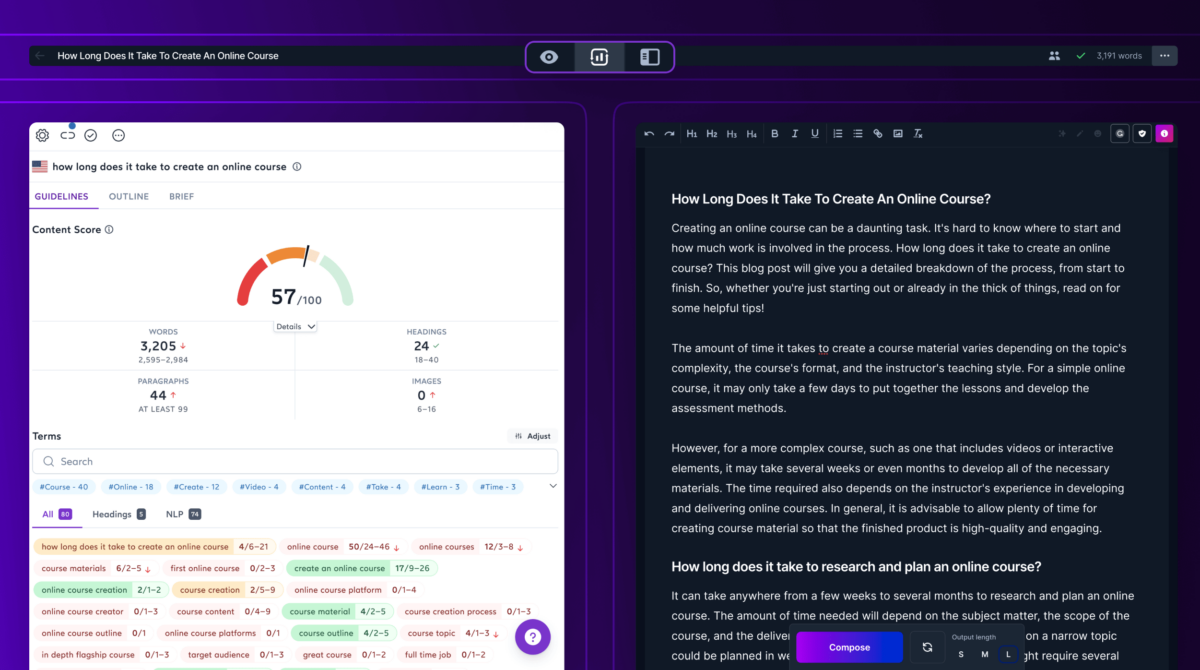
In the last few years, Surfer SEO has almost single-handedly changed the digital landscape. This fantastic tool is used by content creators all over the world to optimize their copies and focus on specific keywords. Surfer SEO works in several languages, so it can provide great results beyond English-speaking countries.
The platform allows you to analyze short and long-tail keywords and create outlines. It shows you how many words you need, how many headings, and which keyword to include. By simply beating the average optimization score, you significantly increase your chance of ranking in Google.
One of Surfer SEO’s biggest advantages is that it helps you avoid potential penalties. Whether you’re going with AI content or manually written posts, you can check the plagiarism before posting.
2. Frase
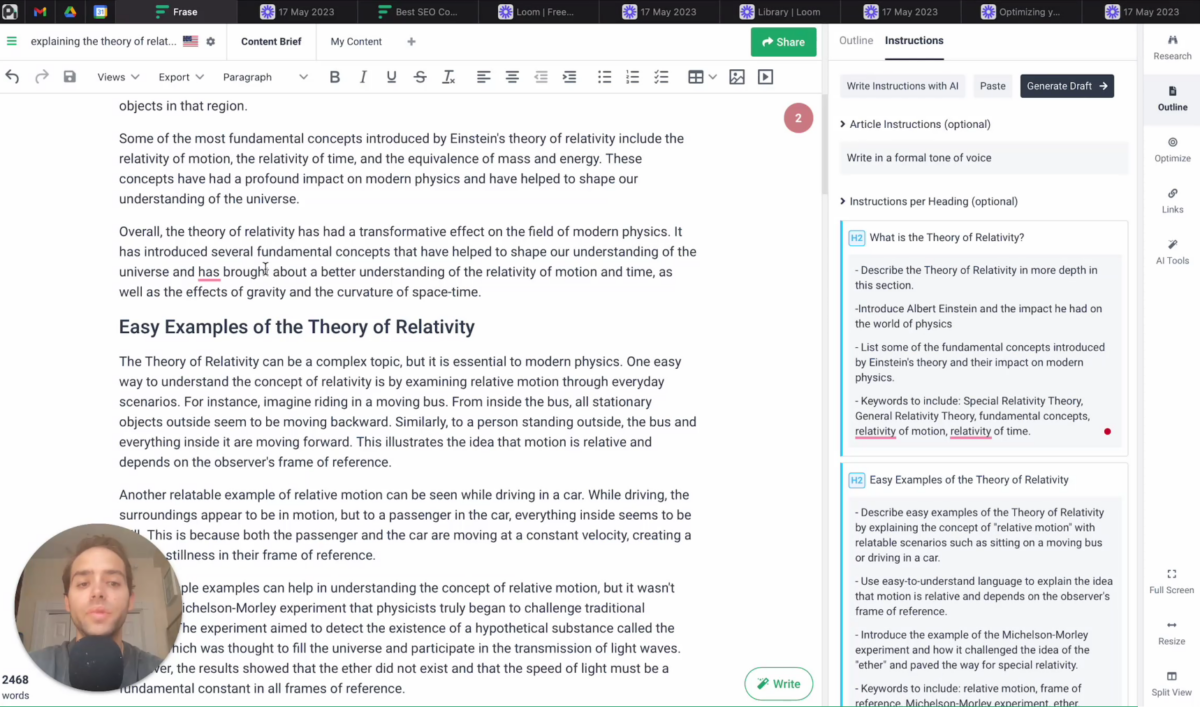
Frase.IO is another excellent tool that writers use for their long-form content. It’s very similar to Surfer SEO in terms of functionality. You can use it to create outlines, find optimal word counts, and add relevant keywords. Like many other AI SEO platforms nowadays, it allows you to auto-generate blog posts.
This fantastic tool is especially great for detecting new opportunities. Content marketers can use it to find keywords that are slipping in SEO rankings and improve them. As such, it can be especially helpful for SEO audits and finding new blog ideas.
I do not publish a single blog post on NealSchaffer.com without optimizing it with Frase.
Is Your LinkedIn Working?
Just released: my new book to help professionals, entrepreneurs, and business owners maximize LinkedIn for real growth.
With years of LinkedIn expertise, Maximizing LinkedIn for Business Growth offers actionable steps to build your brand, expand your network, and drive results.
Start leveraging LinkedIn like never before—grab your copy now! Click the cover or button below to buy on Amazon.
3. Outranking

Outranking is an excellent optimization software that you can use for any type of content. The platform has a complex yet intuitive dashboard with a full SEO and keyword checklist. Besides helping you with word count and keyword optimization, the platform is also fantastic for competition insights and search intent analysis.
One of the tool’s main selling points is its funnel optimizer. You can generate numerous content ideas for different stages of the customer journey, making Outranking perfect for topic clusters. It also has a few critical integrations, allowing users to combine Outranking with Google Docs a WordPress plugin, and native Grammarly compatability.
4. SEMRush
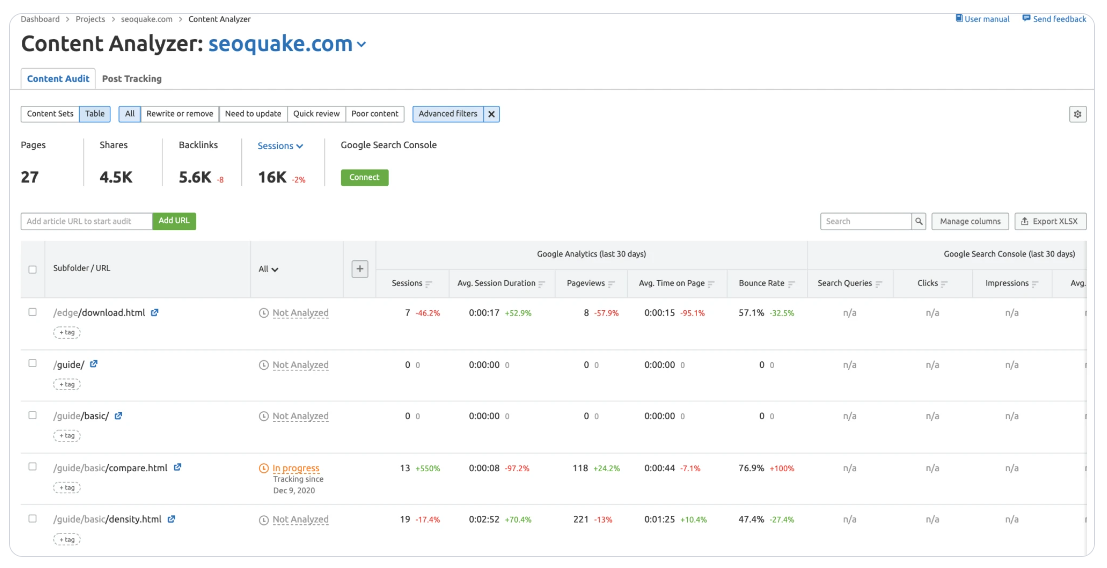
SEMRush is perhaps the most comprehensive SEO platform on the market. You can use it for just about any optimization process, helping you significantly increase your search traffic. Among others, SEMRush allows you to check backlink profiles, discover keywords, and perform market research, and it has a fantastic audit feature.
Although SEMRush isn’t a popular content editor, it can help you with a few things. Specifically, you can use it to find topic ideas, while its SEO writing assistant provides valuable insights regarding the originality and readability of your posts.
It should be noted that SEMrush has recently introduced its own AI-empowered content writing tool, ContentShake, which I highly recommend you check out!
I am a heavy user of SEMrush, and while I have not dived deep into their AI functionality yet, I am extremely excited about it! If you were curious as to how I use SEMrush for SEO, check out my entire process in the video below!
5. Alli AI

Alli AI is a less-known all-in-one SEO tool. Unlike the other SEO AI software on the list, this platform doesn’t help you create content outlines or research keywords. Instead, it provides automatic website-wide suggestions that would help you fix different things on your site.
So, while not perfect for content ideation or creation, Alli AI can still help improve overall content quality on a site to improve your rankings.
6. CanIRank

While this platform isn’t a household name, CanIRank can still help you analyze the keyword potential of certain phrases. Besides the fact this is a powerful keyword research tool, the software can also assist with your content optimization.
The really cool aspect of CanIRank is its over-optimization feature. The platform shows you if you’re overdoing it during search engine optimization while providing actionable insights about page relevancy and strength.
7. MarketMuse

This incredible artificial intelligence SEO tool can help you optimize content for search engines. Marketers often make a choice between this platform, Surfer SEO and Frase. Like the two mentioned platforms, MarketMuse generates outlines that help guide writers during the content creation process.
Besides adding the right phrases, you can also use the content planner for headings, meta descriptions, and other tags. Some people even use it for monitoring external and internal links.
Further Reading: The 23 Best SEO Tools to Power Your Search Engine Marketing
8. Diib

Diib can be of great assistance for content monitoring. The platform has keyword research, rank tracking, and benchmarking features. Unlike the other programs on this list, Diib has free pricing plans with limited functionality. So, you can use it as an ancillary tool for your SEO campaign.
Further Reading: What is SEO Content Writing? 27 Tips to Help You Adapt Your Writing Style to Better Rank
9. SE Ranking
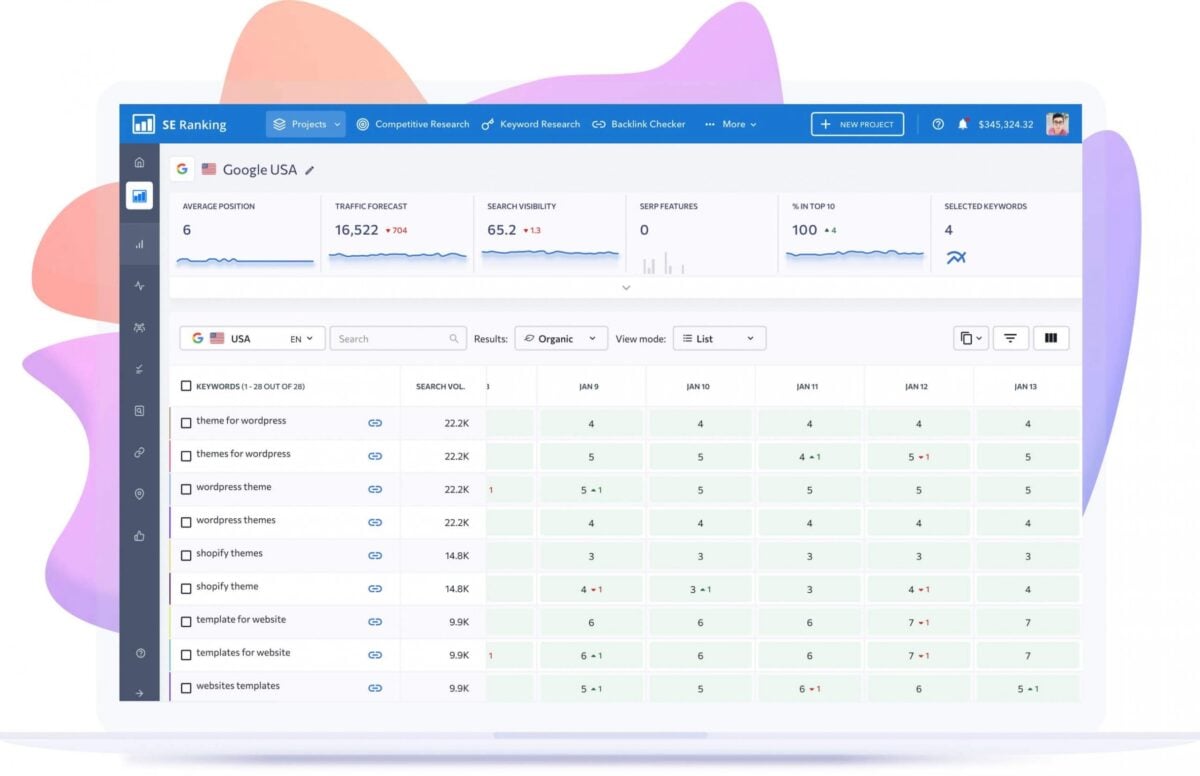
SE Ranking is great for content planning and execution. You can use it to track keyword performance across the board in different search engines. This makes it one of the better platforms for competitive analysis.
Among others, SE Ranking allows you to perform on-page optimization. Although not as comprehensive as SEO Surfer’s complex algorithms, this software provides detailed insights regarding tags, links, indexing, and usability.
Further Reading: The 15 Best Rank Tracker Tools to Rock Your SEO in 2025
10. WordLift

The best knowledge graph builder on this list, Wordlift, can do wonders for your organic traffic. You can use it to automatically add structured data to your content, thus increasing the likelihood of ranking for Google’s snippets. AI-powered SEO software helps crawlers understand your pages, which can have a significant impact on your organic performance.
11. Jasper
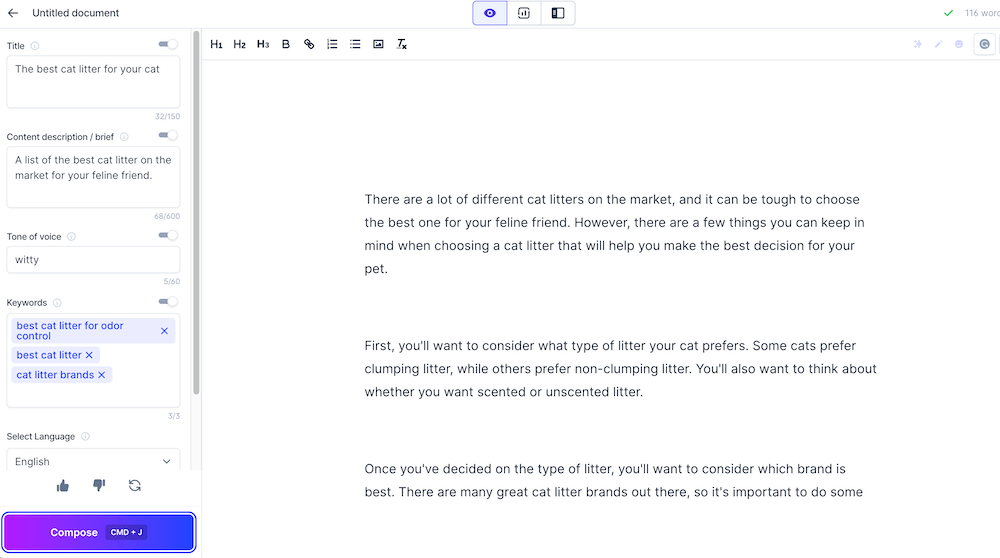
Jasper AI is nowadays recognized as one of the best content-generation platforms in the world. You can use this incredible software for your blog posts, product descriptions, and any other type of text. SEO professionals have already started using this software to hasten and simplify their content writing processes.
The tool has a 7-day free trial, so you can check it out at any time. An awesome thing about this content creator is that you can integrate it with YouTube, Shopify, WordPress, Facebook, Gmail, Amazon, and Google.
If you didn’t know I am a big fan and user of Jasper!
12. INK

INK is a comprehensive AI assistant that can help you with various SEO processes. You can use it during the initial planning SEO phases for keyword research and clustering. Later on, you can use it to generate AI content, optimize it, and rewrite it so it passes all the checkers.
The thing that separates this program from this field is its nifty AI image generator. Aside from enriching your blogs, the feature can also be fantastic for social media posts.
Further Reading: 15 YouTube Video Summarizer AI Tools to Check Out
13. RankIQ

Although RankIQ can’t auto-generate content, it helps you with numerous other tasks. Specifically, you can use it to research various topics and find the most lucrative content ideas. Once you decide on your keywords, you can generate outlines that will guide you through the content creation process.
Title grader is perhaps the platform’s biggest selling point. You can use this feature to improve your titles, making them better for search engines and users.
14. Copy.AI

Copy.AI is one of the better options for generating customized AI content. The tool helps you create various types of posts ranging from blogs, eCommerce content, social media posts, ads, and sales copies. Before generating text, you can also choose the tone and main talking points for that piece.
Copy.AI also allows you to edit your AI posts so they’re better suited for your audience.
Further Reading: 13 Ways to Use AI in Ecommerce in 2025 (with Tools Recommendations)
15. LinkWhisper

LinkWhisper is a pretty straightforward program that allows you to improve your internal link-building. Aside from improving your anchors, it provides numerous other suggestions. Most importantly, it helps you build links based on keywords, so you never connect irrelevant pieces to each other. As such, the tool is perfect for creating funnels.
I am a HUGE fan of LinkWhisper and religiously use it on a regular basis to ensure that I am doing proper internal linking.
Further Reading: The 15 Best Free SEO Tools You Need to Know in 2025
How to Use These AI SEO Tools?
Keep in mind that each one of these platforms has specific features that can help you with different aspects of content creation. Some of them are fantastic for link building, while others excel at keyword research and finding content gaps.
Furthermore, digital marketers often use several platforms for their content strategies, allowing them to utilize each tool’s best functionality. For example, an SEO platform might be excellent for finding content opportunities while providing subpar results for content creation. That being said, optimization professionals might use one powerful tool for SEO content briefs and another program for social media posts.
Anyway, here’s a short breakdown that will help you find the best tool for a particular function:
All-in-One SEO suites:
Content Optimizers
Rank Monitoring
AI Text Generator
Knowledge Graph Builder
Internal Link Optimizer
Whatever the case, it’s best you research these marketing tools, their best features, and blind spots before making the first purchase.
If you are looking for more AI marketing tools, check out my faves in the video below!
Conclusion
When we talk about AI content tools, most people think of software such as Surfer SEO. However, the optimization process is much more complex than some people think. Besides adding keywords and proper word count, it also presumes lots of other actions on the backend.
Each of the programs featured in the article can help you in one way or another. Most people use them in conjunction, utilizing the best functionalities of each one to get even better optimization results.
Which special recipe of AI SEO tools will you find works best for your company?
Further Reading: AI for SEO: 17 Actionable Tips to Rank Higher
2 Comments
Comments are closed.













Thanks, Neal! I’ve been doing SEO for my Mac cleaner (PowerMyMac) recently and this article of yours has helped me a lot by giving me more options for improving the content ranking of my product website, I’ve been using SEMrush in the past, and other tools comparisons although it is powerful, the price is very unfriendly. Thanks for sharing, I will try different SEO tools.
Hey thanks Chloe! Yes there are many tools out there, so find the one that works for you best and GO!